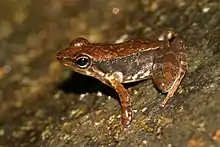Micrixalus herrei
Micrixalus herrei is a newly redescribed species of frog in the family Micrixalidae.[1][2] Originally described in 1942,[3] it was synonymized with M. fuscus in 1984.[4] However, morphological differences as well as DNA evidence confirm this species to be valid.[1] It is endemic to the Western Ghats, India, and occurs south of the Shencottah Gap in Kerala and Tamil Nadu states.[2] The common name Kallar dancing frog has been proposed for this species, in reference to Kallar, Trivandrum, its type locality.[1][2]
| Micrixalus herrei | |
|---|---|
 | |
| Scientific classification | |
| Domain: | Eukaryota |
| Kingdom: | Animalia |
| Phylum: | Chordata |
| Class: | Amphibia |
| Order: | Anura |
| Family: | Micrixalidae |
| Genus: | Micrixalus |
| Species: | M. herrei |
| Binomial name | |
| Micrixalus herrei Myers, 1942 | |
Description
Males measure 16.7–19.4 mm (0.66–0.76 in) and females 24.8–26.6 mm (0.98–1.05 in) in snout–vent length. The head is small and flat above with a pointed snout that is rounded in lateral view. The dorsum is reddish orange with irregular, light brown patches. The tympanum and its surroundings are dark grey. The throat, cheast, and belly are greyish white with some greyish yellow reticulation on the belly.[1]
Male Micrixalus herrei have a single vocal sac and a nuptial pad on the first finger. Characteristic for the genus, they display the foot-flagging behaviour. Male-male combats also involve kicking.[1]
Habitat
The natural habitats of this species are fast flowing streams and rivulets in primary and secondary forests. It is relatively abundant where it has been found.[1]
References
- Biju, S. D.; Sonali Garg; K. V. Gururaja; Yogesh Shouche; Sandeep A. Walujkar (2014). "DNA barcoding reveals unprecedented diversity in Dancing Frogs of India (Micrixalidae, Micrixalus): a taxonomic revision with description of 14 new species". Ceylon Journal of Science (Biological Sciences). 43 (1): 37–123. doi:10.4038/cjsbs.v43i1.6850. (M. herrei: p. 70)
- Frost, Darrel R. (2016). "Micrixalus herrei Myers, 1942". Amphibian Species of the World: an Online Reference. Version 6.0. American Museum of Natural History. Retrieved 30 May 2016.
- Myers, G. S. (1942). "A new frog of the genus Micrixalus from Travancore". Proceedings of the Biological Society of Washington. 55: 71–74.
- Inger, R. F.; H. B. Shaffer; M. Koshy; R. Bakde (1984). "A report on a collection of amphibians and reptiles from the Ponmudi, Kerala, South India". Journal of the Bombay Natural History Society. 81: 406–427.